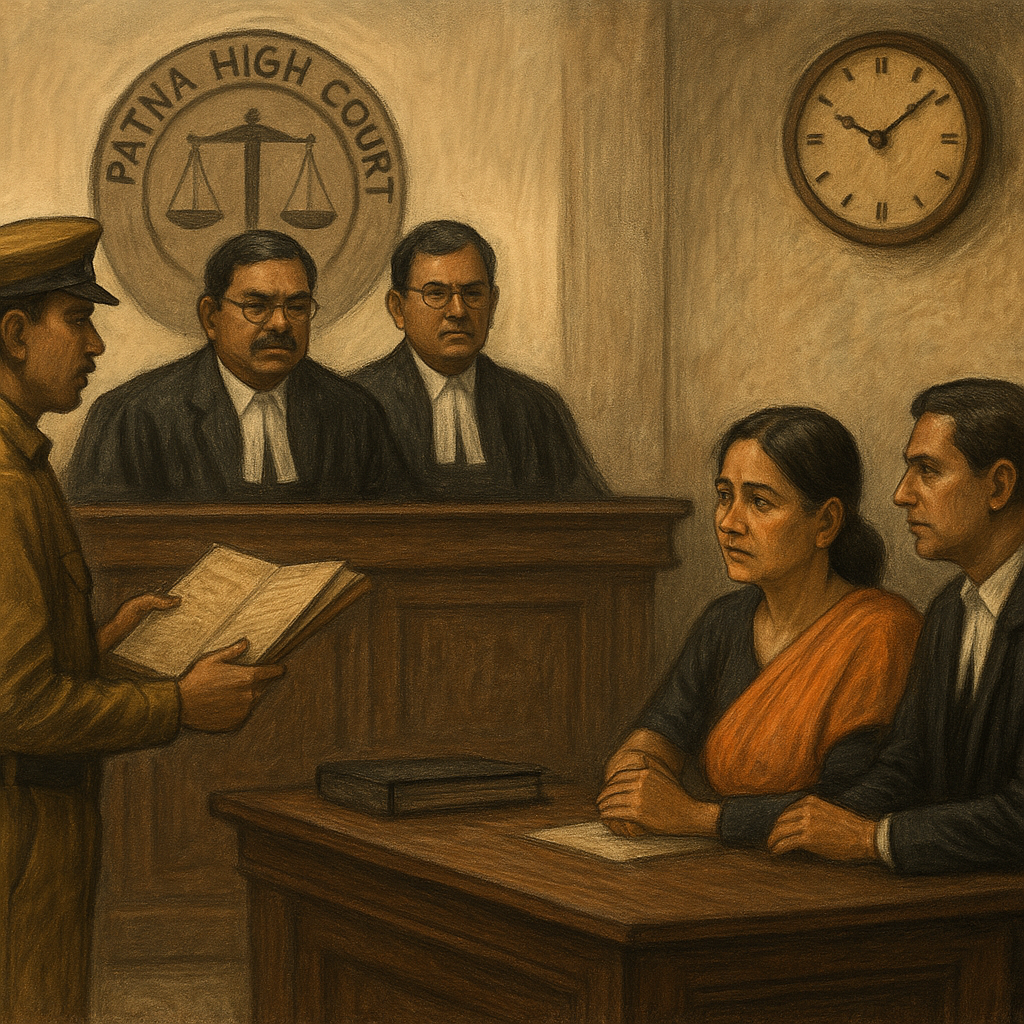Simplified Explanation of the Judgment
The Patna High Court recently delivered a significant judgment in a case concerning delayed adjudication of service tax demands. The petitioner, a proprietorship firm engaged in providing maintenance and repair services, had challenged an order issued by the Central Goods and Services Tax (CGST) authorities imposing service tax, cess, interest, and penalties for the financial years 2012–13 and 2013–14 under the Finance Act, 1994.
The dispute began when the department issued a demand-cum-show cause notice (SCN) on 5 September 2018. It alleged that the petitioner had received payments from customers and failed to correctly assess and pay the corresponding service tax. The department relied on figures from the Income Tax Act records, noting receipts under Section 194C but alleging a mismatch in service tax payments.
Despite being given opportunities to respond, including scheduled personal hearings in November 2023, March 2024, and May 2024, the petitioner did not file a reply or appear before the adjudicating authority. Consequently, on 9 July 2024, the Assistant Commissioner passed the order-in-original confirming a service tax demand of ₹14,10,900, along with cess, for 2012–13 and 2013–14.
The petitioner approached the High Court contending that the adjudication order was issued far beyond the permissible time limit under Section 73(4B) of the Finance Act, 1994. This provision mandates that where the extended limitation of five years is invoked (in cases involving fraud, suppression, etc.), the order determining tax must still be passed within one year from the SCN date “where possible.” In this case, the SCN was issued in September 2018, and even by the extended period, the order should have been passed by September 2019. However, it was passed only in July 2024 — a delay of about five and a half years.
The petitioner relied on previous decisions, including:
- M/s Kanak Automobiles Pvt. Ltd. v. Union of India (Patna High Court) — quashing orders due to similar unexplained delays in adjudication.
- L.R. Sharma & Co. v. Union of India (Delhi High Court) — holding that inordinate delays in adjudication cannot be justified unless there are genuine reasons, as the legislative intent is to conclude proceedings promptly.
The department argued that opportunities were given to the petitioner but not availed. Initially, it hinted that the COVID-19 pandemic contributed to the delay, but the Court noted that the one-year limit expired well before the pandemic began. Furthermore, no reasons for the delay were provided in the counter affidavit.
The High Court emphasised that Section 73(4B) reflects a clear legislative intention to resolve service tax matters within a fixed timeframe to ensure efficiency and fairness. Courts across India, including the Delhi and Gujarat High Courts, have consistently ruled that the “where possible” clause cannot be used to justify excessive, unexplained delays.
Given the unexplained delay of more than five years and the fact that the petitioner’s earlier case for subsequent financial years had already been decided in its favour on identical grounds, the Court quashed the order-in-original dated 9 July 2024.
Significance or Implication of the Judgment
This judgment reaffirms that tax authorities must act within the statutory timelines while adjudicating service tax demands, even in cases where the extended five-year limitation period for issuing notices applies. The decision safeguards taxpayers from prolonged uncertainty and ensures administrative accountability. For businesses, this means that if a show cause notice remains undecided for years without valid reasons, such orders can be struck down. For the government, it highlights the necessity of streamlining adjudication processes to meet legislative deadlines and avoid revenue losses due to procedural lapses.
Legal Issue(s) Decided and the Court’s Decision with Reasoning
- Issue: Whether an order determining service tax liability can be passed more than five years after issuance of a show cause notice when Section 73(4B) prescribes a one-year timeframe “where possible.”
Decision: No. The order was quashed. The department failed to explain why it was not possible to pass the order within one year from the SCN date, as required under Section 73(4B). - Reasoning:
- Section 73(4B) reflects legislative intent for timely adjudication.
- Courts have consistently held that prolonged, unexplained delays violate the statutory mandate.
- The “where possible” clause allows flexibility for genuine, documented reasons, but not for keeping matters pending without justification.
- The delay of over five years was unexplained in the counter affidavit.
- Precedents, including earlier decisions in the petitioner’s own case and judgments from Delhi and Gujarat High Courts, support quashing such delayed orders.
Judgments Referred by Parties
- L.R. Sharma & Co. v. Union of India, 2024 SCC OnLine Del 9031
- M/s Kanak Automobiles Pvt. Ltd. v. Union of India, CWJC No. 18398 of 2023 (Patna High Court)
Judgments Relied Upon or Cited by Court
- Sunder System Pvt. Ltd. v. Union of India, 2020 (33) G.S.T.L. 621 (Del)
- National Building Construction Co. Ltd. v. Union of India, 2019 (20) G.S.T.L. 515 (Del)
- Siddhi Vinayak Syntex Pvt. Ltd. v. Union of India, 2017 (352) E.L.T. 455 (Guj)
Case Title
Proprietorship Firm v. Union of India & Ors.
Case Number
Civil Writ Jurisdiction Case No. 16772 of 2024
Coram and Names of Judges
Hon’ble Mr. Justice Rajeev Ranjan Prasad
Hon’ble Mr. Justice Ashok Kumar Pandey
Names of Advocates and Who They Appeared For
For the Petitioner: Mr. Aditya Prakash, Mr. Rudra Pratap Singh, Mr. Sudarshan Kumar, Mr. Akshansh Ankit, Advocates
For the Respondents: Mr. Anshuman Singh, Senior Standing Counsel
Link to Judgment
cd5104e9-1fe7-4ce3-9d85-570496cb116a.pdf
If you found this explanation helpful and wish to stay informed about how legal developments may affect your rights in Bihar, you may consider following Samvida Law Associates for more updates.









